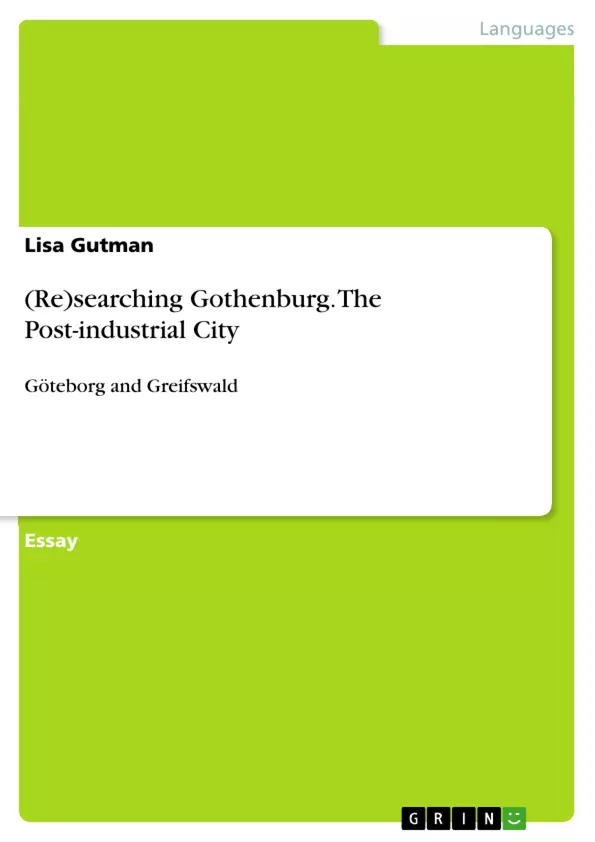In accordance with the book "(re)searching Gothenburg", the aim of this essay is to show that “general social processes can also be studied in smaller and peripheral cities, together with their unique aspects” (Holgersson et al., p 26) - but, above that, to take that idea one step further into the periphery of the world.
Accordingly, this essay is going to analyse a small, rather unimportant and unknown city in north-eastern Germany: the University and Hanseatic City of Greifswald. The paper looks at the historical and cultural development and significance of Greifswald.
It concludes that this small, rather unimportant and unknown city in north-eastern Germany might be the perfect example of a successful transformation with its historic, but renovated inner city, the cobblestoned streets with modern small shops, altogether with its particular 'nerdy', campus-like, and authentic feel.
Inhaltsverzeichnis (Table of Contents)
- (re)searching Gothenburg: A Comparison to Greifswald
-
Greifswald's History and Development
- Early History and Hanseatic Influence
- Swedish Rule and the Rise of the University
- The Industrial Revolution and Urban Transformation
- The Impact of World Wars and the GDR Era
- The Rise of Plattenbauten and Urban Renewal
- Post-Unification: Reconstruction and Gentrification
- Comparison to Gothenburg
Zielsetzung und Themenschwerpunkte (Objectives and Key Themes)
This essay examines the historical development of the city of Greifswald, Germany, in comparison to Gothenburg, Sweden, to demonstrate that general social processes can also be studied in smaller, peripheral cities. By analyzing Greifswald's unique historical context, the essay aims to highlight the commonalities and differences between the two cities and to explore the influence of global and local factors on urban development.
- The influence of historical events and economic factors on urban development
- The role of the university in shaping the social and cultural landscape of both cities
- The impact of industrialization on urban growth and social change
- The evolution of housing policies and their effects on urban development
- The role of cultural movements and social groups in shaping the character of the city
Zusammenfassung der Kapitel (Chapter Summaries)
- (re)searching Gothenburg: A Comparison to Greifswald: This chapter introduces the main objective of the essay, which is to compare the historical development of Greifswald to Gothenburg. The essay argues that general social processes can be studied in smaller, peripheral cities.
- Greifswald's History and Development: This section provides a detailed overview of Greifswald's history, starting from its early development as a Hanseatic city to its role as the cultural and economic center of Swedish-Pomerania. The chapter also examines the city's growth during the Industrial Revolution and the impact of World Wars and the GDR era on its urban landscape.
- The Rise of Plattenbauten and Urban Renewal: This chapter explores the rise of Plattenbauten in Greifswald, comparing them to the Miljonprogrammet in Sweden. The chapter analyzes the motivations behind this type of housing construction and its effects on the city's social and spatial structure.
- Post-Unification: Reconstruction and Gentrification: This section discusses the reconstruction and restoration efforts undertaken in Greifswald after the unification of Germany. The chapter focuses on the impact of gentrification on the city's historical center and the changing demographics of the urban population.
- Comparison to Gothenburg: This chapter compares the development of Greifswald to Gothenburg, highlighting both the similarities and differences between the two cities. The essay examines the impact of global and local factors on urban development and the role of cultural movements in shaping the character of each city.
Schlüsselwörter (Keywords)
The key themes and concepts explored in this essay include: urban development, historical comparisons, peripheral cities, industrialization, housing policies, cultural movements, gentrification, university cities, and the influence of global and local factors on urban change.
Frequently Asked Questions
Why compare Greifswald to Gothenburg?
The essay demonstrates that general social processes, such as urban transformation and gentrification, can be studied effectively in smaller, peripheral cities like Greifswald, not just large ones like Gothenburg.
What is unique about Greifswald's history?
Greifswald has a rich Hanseatic history and was under Swedish rule for a significant period, which influenced the rise of its university and its cultural identity.
What are "Plattenbauten" in the context of this essay?
Plattenbauten are prefabricated buildings from the GDR era, compared in this study to Sweden's "Miljonprogrammet" housing initiatives.
How did German unification affect Greifswald's urban landscape?
Post-unification led to massive reconstruction and restoration of the historic inner city, though it also brought challenges like gentrification.
What is the conclusion regarding Greifswald's transformation?
The essay concludes that Greifswald is a successful example of transformation, maintaining an authentic, "nerdy" campus-like feel while modernizing its historic core.
- Quote paper
- Lisa Gutman (Author), 2014, (Re)searching Gothenburg. The Post-industrial City, Munich, GRIN Verlag, https://www.grin.com/document/349144



